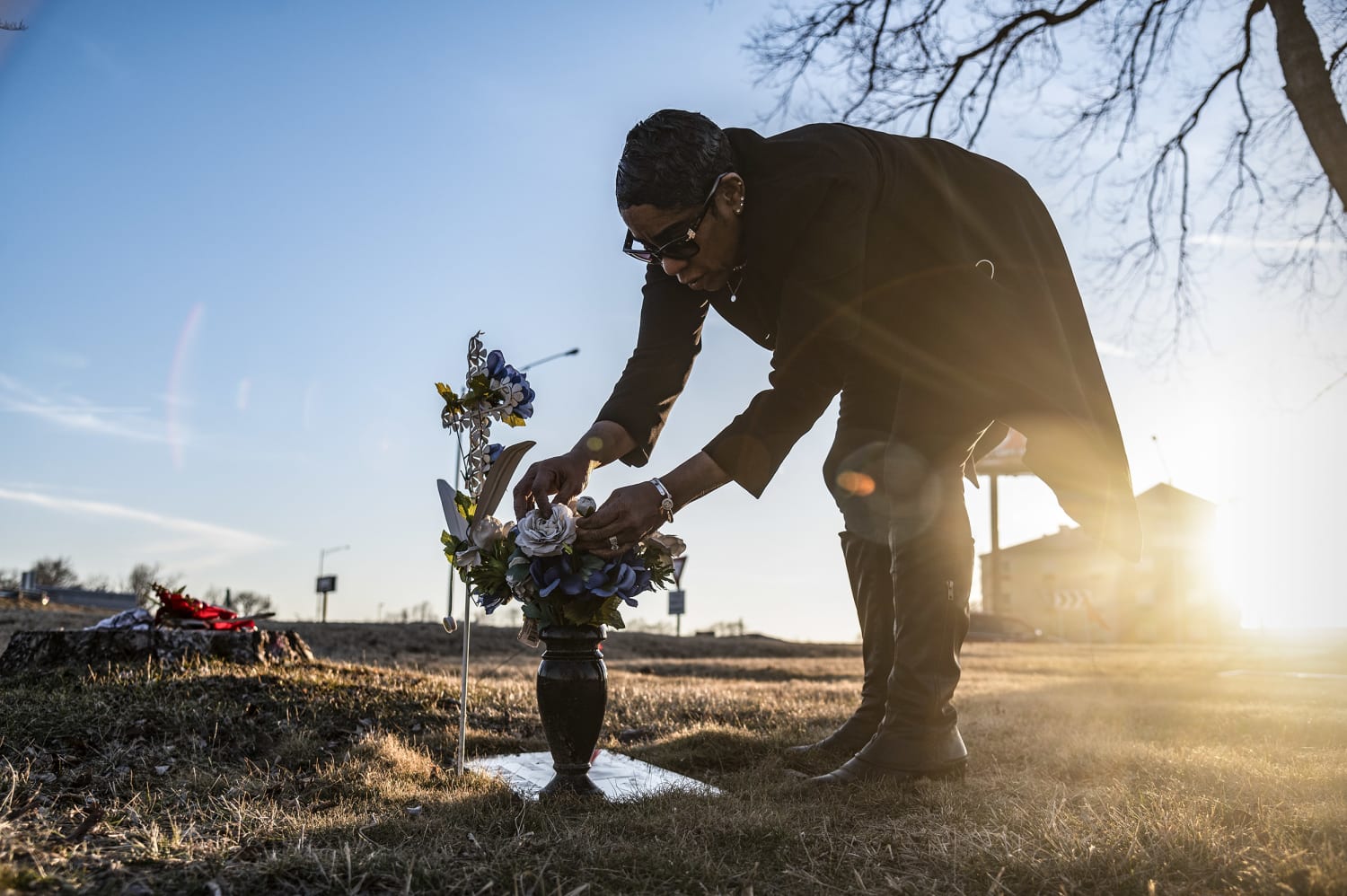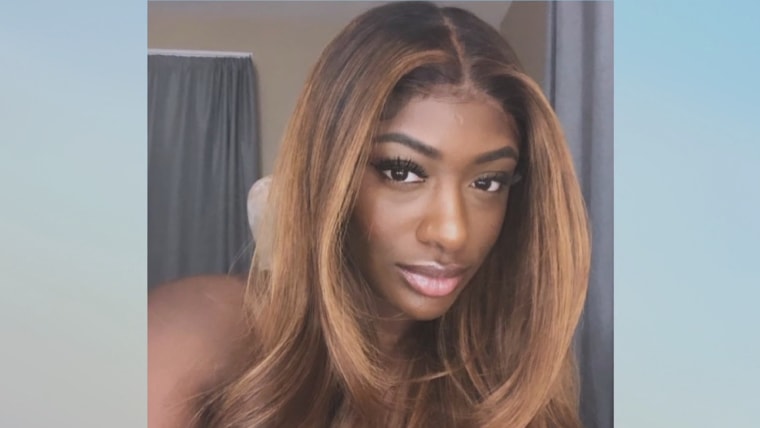At about 1:30 a.m. on July 8, 2020, Freddie McKee sent what would be his last text message to his mother. The Powerball jackpot had climbed to almost $70 million, and he was indulging in a daydream to get his family a new house.
“If I win you already know what I’m gonna buy you and grandma and aunt gay,” the 37-year-old wrote.
Doressia McKee was asleep at the home she shared with her son in Columbia, Missouri. That morning, his half-brother called with devastating news: Just after 6 a.m., Freddie McKee was found dead outside his father’s house a few miles away. He was shirtless. The results of an autopsy would later reveal multiple cuts and bruises on his 5-foot-11-inch, 143-pound frame, the most significant on his elbows and knees. There were small scrapes on his scalp and shoulders. A fingernail on his right hand was partially missing.
A question hung over Doressia McKee: How did this happen?
A toxicology report from the Office of the Medical Examiner in Columbia reviewed by NBC News and based on testing done on July 9 made no mention of an illegal drug in his system, but a “corrected” report from the same office issued two months later said that Freddie McKee had a noticeable level of a psychoactive stimulant known as eutylone in his body. The medical examiner ruled his death accidental, and the death certificate dated Oct. 9 said there was “excess use of a drug.”
The puzzling circumstances surrounding the last hours of her son’s life were made no less confusing when the police got involved, said Doressia McKee, who accused the department in a complaint filed with its Internal Affairs Division of mishandling the initial investigation by failing to interview witnesses and review all the potential evidence and said she was offended over disparaging remarks she said a detective made to her about residents in the mostly Black and lower-income neighborhood where her son died.
Given the conflicting evidence, she believes that at minimum, police failed to vigorously investigate; at worst, she believes there was a crime or foul play involved in her son’s death, and the police’s actions were tantamount to a “cover-up.”
“We feel they failed to do so because this was just another Black male that they didn’t care about, and felt his life wasn’t worthy of the same opportunity and equality that is given to all the other white suspicious death cases,” Doressia McKee said.
In April 2021, she filed a misconduct complaint with Columbia police in which she laid out why she believes there were flaws with the department’s handling of the case. Six months later, Police Chief Geoff Jones responded in a letter that her allegations were “unfounded” and “misconstrued” but she could appeal to the city’s Citizens Police Review Board.
She did. Last November, the review board unanimously recommended that Jones reconsider the misconduct claim and either “reaffirm or modify” his decision. And a year and a half after Doressia McKee began pressing for answers, Columbia police agreed to not only reopen the department’s internal affairs investigation but the investigation into Freddie McKee’s death as well. Both investigations remain ongoing.
Observers say her resolve shows the lengths to which people from marginalized communities often go to ensure they are being afforded a thorough investigation. In recent weeks, the treatment of Black victims during the course of police work and accusations of racial insensitivity were highlighted by cases in Connecticut and the fatal shooting of a Black man in Missouri.
“There’s a saying that the system is designed to wear you down,” said state Rep. David Tyson Smith, who helped to create Columbia’s first Citizens Police Review Board in 2009 following tensions between police and the community. It is rare, he added, that the review board’s suggestion would compel police to agree to reopen an investigation.
“It’s a testament to the mother that she didn’t give up,” Smith said.
Investigation questioned
On the day her son was found dead, Doressia McKee drove to his father’s home and saw his body for herself.
According to the appeal she filed with the Citizens Police Review Board, which cites toxicology and autopsy reports, his pants were found muddied, as if he had been dragged. He was on his back with his hands up, she said, and he was pressed up against the last step of the home’s front patio in a position that Doressia McKee says suggests he was placed there. Her son was also missing one of his black Adidas shoes and his cellphone, both of which were later recovered from a neighbor’s yard.
Police failed to fully interview witnesses, Doressia McKee told the review board, and family members also wrote statements for police they say were never followed up on.
“How can you reopen a case and reinvestigate something that you never investigated from the beginning?”
Freddie Mckee’s aunt said
Doressia McKee said she spoke with the neighbor, and the woman told her she confronted Freddie McKee when she saw him in her yard. The neighbor said he politely told her he was looking for his phone. Since it was around 3 a.m., the neighbor said she called 911 as a precaution.
Doressia McKee told NBC News that when she asked police about the 911 call, they said it did not exist. But McKee says the neighbor sent her a screenshot from her phone of when she dialed for assistance, and Doressia McKee said she was later able to obtain a recording of the call from Boone County’s emergency communications center.
She also said in her appeal to the review board that the detective in the case, Steven Wilmoth, did not do his due diligence in interviewing the neighbor and told her the neighbor “was probably not going to tell the truth.”
There were other questions that should have been adequately answered, Doressia McKee told the review board, including what occurred after the neighbor called for police assistance at 3 a.m. to about 6 a.m., when her son’s body was found; what happened when police arrived; and if any of the cameras at the home had recorded events from that morning.
There is also the issue of Freddie McKee’s wallet, which Doressia McKee said warranted further investigation after it was returned to the family with only his identification in it, and was missing other items, such as his credit cards, casino cards and cash.
But perhaps most troubling, she told the review board, was how Wilmoth, who is white, suggested to her that people in the neighborhood were either drug dealers or liars, and therefore couldn’t be trusted, which she found demeaning and racist.
Wilmoth filed a temporary restraining order against the city in October to prevent it from releasing other police records to Doressia McKee, who made a request for them in August 2020 in which she alleged police misconduct. Wilmoth argues that the information involving internal investigations is protected under a state law passed last year. In its response filed in Boone County Circuit Court, the city said it believes the records are “expressly open.” A trial is scheduled for March.
Jones, the police chief, did not address the temporary restraining order request in a letter to the review board in December stating that he would reopen the investigation. However, he said an “an uninvolved detective sergeant” would be brought on to the case.
A Columbia police spokesperson declined to comment further, citing pending litigation. Neither an attorney representing Wilmoth nor the local police union responded to requests for comment.
Given that police initially denied any misconduct, Freddie McKee’s family wants an outside agency to conduct a new investigation to ensure accountability.
“How can you reopen a case and reinvestigate something that you never investigated from the beginning?” asked Gabrielle Copes, a sister of Doressia McKee whom Freddie McKee called his aunt Gay. “The trust is broken.”
A search for answers
For about the first 15 years of Freddie McKee’s life, he was raised solely by his mother. Doressia McKee was 21 when she gave birth to Freddie, and believed it was better to care for her son and a daughter from another relationship alone.
But when he was older, Freddie McKee reconnected with his dad, also named Freddie, and Doressia McKee said there was little she could do to discourage it.
After her son began using marijuana, which remains illegal for recreational use in Missouri, court records show arrests over the years related to marijuana possession.
Attempts to reach his father, Freddie Gardner, by phone were unsuccessful.
The younger Freddie’s previous offenses led to several years in prison; when he died, he had been free for more than a year. Doressia McKee said his incarceration affected his mental health, and according to court records, he was on antipsychotic medication at the time of his evidentiary hearing following his arrest.
The autopsy, issued in September 2020, said Freddie McKee had eutylone in his system as well as caffeine, nicotine, and medications used as an antidepressant and to treat psychotic disorders.
Eutylone, a type of synthetic bath salt, emerged in the illegal drug market in the United States in 2014. The drug has been fading in popularity in recent years, toxicologists say, and many labs do not have a method or standard for testing or looking for eutylone.
A 2020 study of eutylone intoxications found that the stimulant can “impair human performance of users and is a significant contributor to cause of death in susceptible individuals.”
While the concentration of eutylone that medical examiners report was in Freddie McKee’s body would be in line with the amount found in other cases in which individuals had died, a person’s general health and the circumstances surrounding the death must also be considered, said Alex Krotulski, an associate director at the Center for Forensic Science Research & Education in Pennsylvania and a researcher on the study.
Doressia McKee said she does not believe her son would have knowingly taken bath salts and questioned why police wouldn’t have wanted to investigate how a drug like that would have come into the community. She said when she spoke with the medical examiner’s office, it told her the scrapes and bruises on his body were not self-inflicted or from an animal but could have been caused by an altercation.
The medical examiners office in Columbia did not respond to calls seeking comment.
‘It’s a breakthrough’
Freddie McKee’s family is focusing on what happened to him on the day he died.
“Freddie was a gentle soul and he deserved an investigation,” Copes, his aunt, said.
Source: | This article originally belongs to Nbcnews.com











